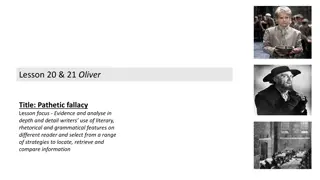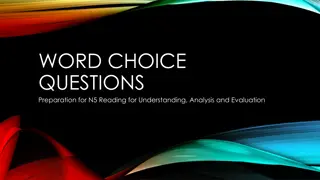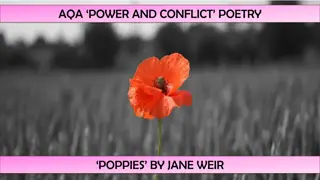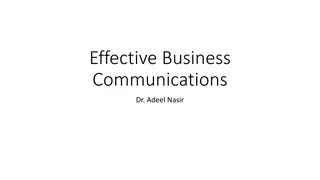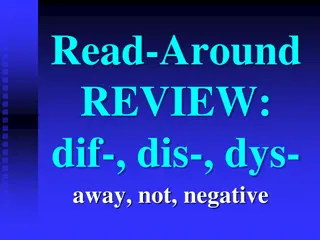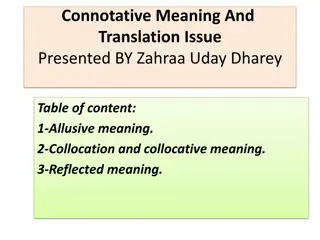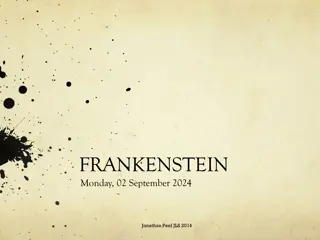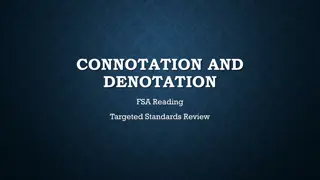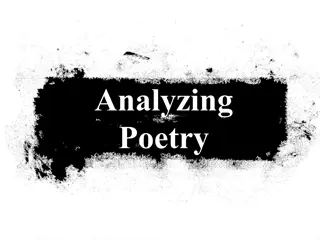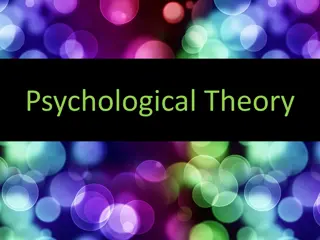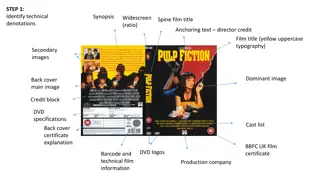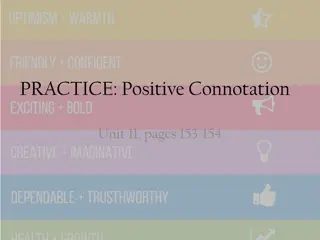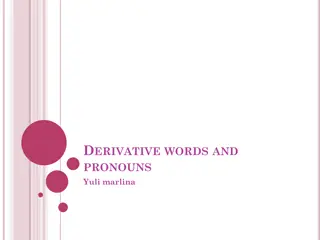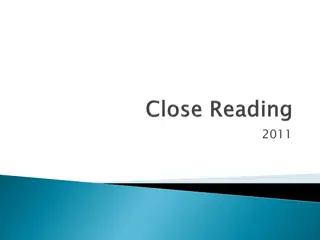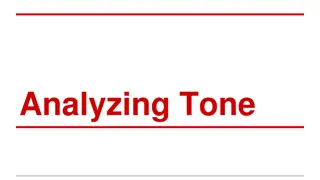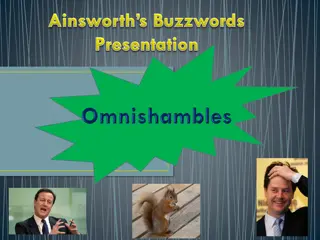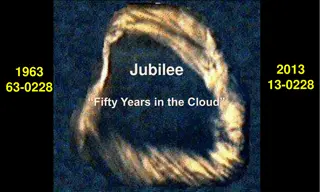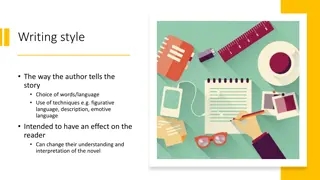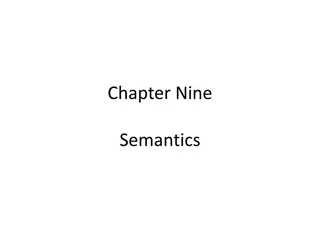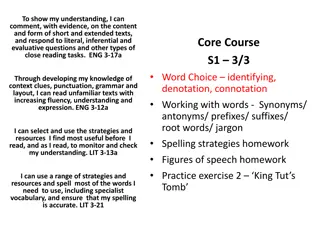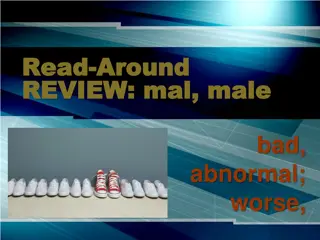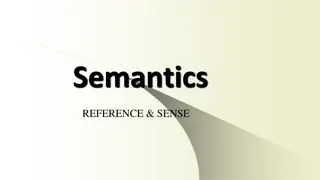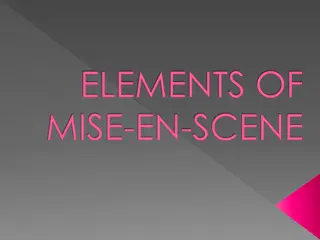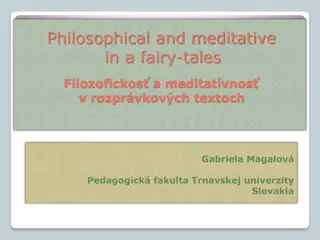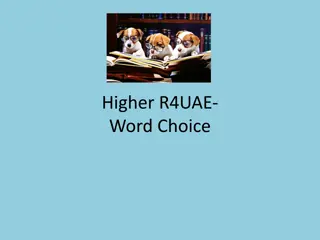Understanding Discrimination and Sexual Harassment Policy in AMVETS
This content provides insights into the policy and definitions of discrimination, sexual harassment, and examples within the context of AMVETS organization. It explains the prohibited behaviors, such as gender-based harassment, and outlines the scope of the policy in addressing discrimination based
1 views • 19 slides
Understanding Pathetic Fallacy in Literature: An In-Depth Analysis
Delve into the world of literature as we explore how writers, such as Charles Dickens and Shakespeare, skillfully use pathetic fallacy to create specific moods and atmospheres. Learn about the connotations and effects of weather on storytelling while analyzing key literary works like "Oliver Twist"
0 views • 15 slides
Developing Word Choice Skills for N5 Reading
Enhance your ability to analyze word choice in N5 Reading passages to understand connotations and meanings. Practice identifying the nuances in different words to improve reading comprehension skills.
0 views • 13 slides
Exploring Connotations of Poppies in Jane Weir's Poem
The content delves into the associations and connotations typically linked with poppies, focusing on Jane Weir's modern poem "Poppies." It discusses the significance of the poppy in remembrance, weaving together historical context and the poet's personal aims in capturing the theme of loss and paren
1 views • 16 slides
Mastering Effective Business Communications: Key Concepts and Challenges
Explore the essential concepts of business communications, including denotation, connotations, euphemisms, and perception of reality. Gain insights into the nuances of communication and how misinterpretations can arise. Enhance your understanding of language usage to communicate more effectively in
0 views • 12 slides
Vocabulary Building: Prefixes for Negative Meanings
Explore the prefixes "dif-," "dis-," and "dys-" with words like disagree, disobey, differentiate, and disconnect to understand how they convey negative or opposite meanings. Engage with terms like dismiss, dispense, and differ to grasp the nuances of language when expressing disagreement or non-comp
0 views • 19 slides
Exploring Connotative Meaning and Translation Issues in Language
Delve into the nuances of connotative meaning through allusive, collocation, and reflected meanings. Discover how translation challenges arise due to cultural nuances and connotations, as exemplified by various expressions and word associations. Explore the significance of appropriate collocations i
0 views • 16 slides
Exploring Contextual Ideas in Frankenstein by Mary Shelley
An analysis of contextual ideas related to the study of Frankenstein by Mary Shelley. Delve into the key connotations, connections with other literary texts, and the enduring resonance of a novel written almost 200 years ago. Understand the significance of the contexts in which literary texts are wr
0 views • 57 slides
Understanding Connotation and Denotation in Language
Explore the concepts of connotation and denotation in language through examples and explanations. Understand how words convey emotional weight and associations beyond their dictionary definitions. Delve into the significance of connotations in shaping our perceptions of words and their meanings.
0 views • 9 slides
Analyzing Poetry: Understanding the Depths of Verses
Dive into the intricate world of poetry analysis through SOAPS, TP-CASTT, and DIDLS methods. Explore the elements of subject, occasion, audience, purpose, speaker, and more to unravel the layers of meaning in poems. Learn how to decode titles, paraphrase verses, uncover connotations, analyze attitud
0 views • 16 slides
Understanding Connotation and Denotation in Language
Connotation and denotation play crucial roles in assigning meaning to words. While denotation refers to the literal dictionary definition of a word, connotation involves the emotional and imaginative associations surrounding it. This distinction is exemplified through words like "house" and "home,"
0 views • 21 slides
Overview of Psychological Theory in Literature
Psychological theory in literature encompasses two critical viewpoints - one focusing solely on the text itself and the other on the author. The first approach delves into conflicts, characters, dream sequences, and symbols present in the work, revealing inner desires and conflicts within characters
0 views • 17 slides
Understanding Connotation and Denotation in Language
Learn about the difference between connotation and denotation in language, where connotation refers to the emotional meaning of a word and denotation to the literal definition. Discover how words can have different connotations based on personal, cultural, or universal experiences, and consider exam
0 views • 9 slides
Analyzing DVD Cover Design Elements for Pulp Fiction
Identifying technical denotations and developing connotations from the DVD cover of Pulp Fiction, focusing on elements like the spine details, synopsis, anchoring text, dominant images, and cast list to understand the design choices and intended messages.
0 views • 6 slides
Practice Positive Connotation in Tourism Marketing
Explore the importance of using positive connotations in advertising and promotion within the tourism industry. Learn how to describe features and facilities attractively, appeal to different target audiences, and present products in a positive light. Dive into ways of conveying positivity and avoid
0 views • 10 slides
Understanding Derivative Words and Prefixes in English Language
Delve into the world of derivative words, prefixes, and pronouns with insights on basic terms, the definition of prefixes, common prefixes in texts, prefixes' meanings and connotations, derivational suffixes, and a list of English words of Indonesian origin. Explore the modification and creation of
0 views • 21 slides
The Debate Between Reading Books and Playing Video Games
The text analyzes how word choice emphasizes the argument that reading books enriches the mind while playing video games deadens it, showcasing the contrasting viewpoints. It delves into connotations of words like "glorious" and "enriches" to convey the writer's perspective. Furthermore, it question
0 views • 36 slides
Understanding Tone and Mood in Literature
Tone refers to the author's attitude towards the subject, while mood is the emotional atmosphere of the text. The difference lies in how the author feels versus how the reader feels. Understanding and analyzing tone involves considering aspects like diction, imagery, figurative language, and syntax.
0 views • 14 slides
Unraveling the Origins and Evolution of "Omnishambles
Delve into the intriguing history of the word "Omnishambles," starting from its roots in Middle English to its resurgence in the political realm. Learn about its connotations, lexical processes, semantic changes, and potential longevity as a term that transcends beyond politics. See how this uniquel
0 views • 14 slides
Reflections on the Biblical Jubilee: Past, Present, and Future
Dive into the significance of the Jubilee year as outlined in the book of Leviticus. Explore the spiritual connotations of jubilees through historical references and prophetic insights, connecting past events to contemporary manifestations. Witness the anticipation of jubilant celebrations at the Az
0 views • 32 slides
Analyzing Writing Style Techniques in Chinese Cinderella
The way an author tells a story through writing style features like first-person point of view, rhetorical questions, dialogue, and connotations can greatly impact the reader's understanding and interpretation of a novel. Through the use of personal pronouns, rhetorical questions, direct dialogue, a
0 views • 8 slides
Exploring Semantics: Meaning of Words and Concepts
Semantics is the study of the meaning of words, ranging from their basic literal components to their associative connotations. This branch of linguistics focuses on objective meaning shared by all rather than subjective interpretations. Concepts like conceptual and associative meanings are explained
0 views • 22 slides
Understanding Word Choice in Reading and Writing
Explore the significance of word choice in texts through discussions on synonyms, connotations, and denotations. Understand the impact of vocabulary richness on writing quality and reader perception. Learn to identify denotations and connotations of words in order to grasp their intended meaning. Pr
0 views • 8 slides
Unveiling the Roots of "Mal" and "Male": Exploring Words Associated with Badness
Delve into the origins and meanings of the terms "mal" and "male" as they relate to negative connotations like badness, abnormality, and wrongdoing. Uncover words like malfeasance, malnourished, malefactor, and more that shed light on various aspects of bad behavior and health conditions.
0 views • 24 slides
Understanding Semantics: Meaning, Reference, and Sense
Explore the intricate world of semantics through an analysis of meaning, reference, denotation, connotation, and the classification of meaning by G. Leech. Delve into the concepts of conceptual and associative meanings, and understand the importance of sense in expressions. Learn how connotations pl
0 views • 32 slides
Understanding Entrepreneurship: Origins, Definitions, and Characteristics
Entrepreneurship is a vital aspect of economic growth and development. This text explores the origins of entrepreneurship, defines it through the lens of prominent figures like Richard Cantillon and J.B. Say, and outlines the key characteristics and functions of successful entrepreneurs. It sheds li
1 views • 13 slides
Exploring Key Elements of Mise-en-Scène in Film
Mise-en-scène encompasses everything that appears before the camera, from sets and props to actors and lighting, shaping a film's visual narrative and conveying emotions. This article delves into various aspects like composition, props, blocking, lighting, and scenic atmosphere connotations, sheddi
0 views • 12 slides
Exploring the Meditative Fairy Tales: A Philosophical Perspective
Delve into the realm of meditative fairy tales, a concept not widely recognized in literary theory but significant in conveying deeper messages to both children and adult readers. This exploration touches on the intertwining of the fabulous genre with profound connotations, highlighting the nuanced
0 views • 10 slides
Exploring the Power of Word Choice in Analyzing Literary Texts
Delve into the intricacies of word choice analysis with a focus on connotations, denotations, and the impact of specific words on the overall tone and imagery of a piece of writing. Understand the significance of selecting the right words and explore how they shape the reader's perception and emotio
0 views • 8 slides
Unlocking the Power of Single Word Analysis in Literary Interpretation
Enhance your analytical skills with step-by-step guidance on dissecting quotes, understanding connotations, identifying literary techniques, and exploring deeper meanings in texts. Delve into the glory of single words to elevate your understanding and interpretation of literature.
0 views • 4 slides
Understanding Word Choice and Interpretation in Literary Analysis
Explore the nuances of word choice in literary analysis through examples and explanations in the context of positive childhood memories and disappointment, focusing on connotations, denotations, and personal interpretations.
0 views • 40 slides
Evolution of Word Meanings: A Linguistic Perspective
Explore how words evolve in meaning over time, touching upon the concepts of semantics, narrowing of meaning, degeneration, and regeneration. Discover how the same word can hold different connotations for various individuals. Delve into examples of semantic changes through linguistic shifts such as
0 views • 5 slides

